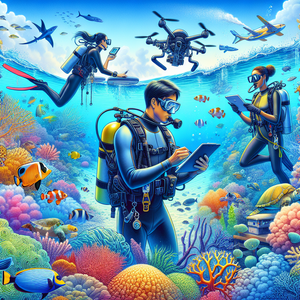The Sonic Symphony of the Seas: How Whale Acoustics DJs Are Redefining Music

At its core, the work of whale acoustics DJs is a marriage between two disciplines that might initially seem worlds apart: marine biology and sound engineering. Whales produce a wide range of sounds, from the iconic humpback whale songs to the clicks and whistles of orcas and the low-frequency moans of blue whales. These sounds serve a variety of purposes—communication, navigation, and even mating rituals. But to whale acoustics DJs, these vocalizations are more than just biological phenomena; they are raw, untapped musical material. The process begins with the painstaking collection of underwater recordings. Specialized hydrophones—underwater microphones—are deployed to capture whale songs and ambient ocean sounds. These recordings are then brought into the studio, where DJs use advanced sound editing software to isolate, manipulate, and remix the audio. The result is an entirely new genre of music that exists at the intersection of nature and technology, science and art. The blending of these two disciplines has not only enriched music but also deepened our understanding of marine life. For example, a whale DJ may amplify certain frequencies of a humpback whale’s song to highlight its complex structure, revealing new insights for marine biologists. This collaboration between artistic innovation and scientific research is redefining what it means to explore the depths of the ocean.
Transcending Traditional Music Norms
What sets whale acoustics DJs apart from other experimental musicians is their commitment to authenticity and their reverence for the natural world. Rather than merely sampling whale sounds as a novelty, these artists seek to honor and amplify the emotional depth of these underwater symphonies. They create pieces that are immersive and atmospheric, often blending whale calls with subtle electronic beats, ambient textures, and even live instrumentation. The result is music that defies categorization—at once meditative and dynamic, ancient and futuristic. Listeners often describe these compositions as transformative. The haunting melodies of whale songs, layered with the rhythmic ebb and flow of ocean currents, evoke a sense of wonder and interconnectedness. For many, it’s a reminder of the vastness of our planet and the intricate web of life that binds us all. Take the work of DJ Oceana, one of the pioneers in this niche field. Known for her intricate soundscapes, she layers orca whistles with the low hum of blue whales, complemented by soft percussion that mimics the gentle crash of waves. Her performances, often held in immersive domes where visuals of the ocean accompany the music, have been described as "profoundly moving" by attendees.
The Emotional and Therapeutic Impact
The appeal of whale acoustics DJing goes beyond its novelty or artistic innovation; it taps into something deeply primal. Humans have long been drawn to the ocean, finding solace in its vastness and rhythm. Whale songs, in particular, resonate with our innate sense of connection to nature. Studies have shown that listening to natural sounds, including whale calls, can reduce stress, lower blood pressure, and improve focus. Whale acoustics DJs are harnessing this potential, creating playlists specifically designed for relaxation, meditation, and even sleep therapy. These therapeutic applications have garnered attention from wellness communities, further solidifying the genre’s place in both the music and health industries. For instance, DJ Oceana’s album “Echoes of the Abyss,” which features slowed-down humpback whale calls layered over ambient drones, has been used in therapy sessions and meditation retreats with remarkable results. Listeners report feeling calmer, more centered, and deeply connected to the natural world. The album has even been incorporated into sleep therapy programs, helping individuals combat insomnia by mimicking the soothing environment of the sea.
A Call to Action
Beyond their artistic and therapeutic contributions, whale acoustics DJs are also raising awareness about the fragility of our oceans and the creatures that inhabit them. By bringing the sounds of the sea to audiences around the world, they are fostering a deeper appreciation for marine life and the urgent need for conservation. Many of these artists partner with environmental organizations, using their performances as platforms to advocate for cleaner oceans and stricter protections for marine species. Some even donate portions of their proceeds to initiatives aimed at combating ocean pollution and protecting endangered whales. DJ Oceana, for example, has collaborated with marine conservation groups to create “Sonic Waves for Change,” a series of live performances where ticket proceeds fund ocean clean-up projects and whale preservation programs. Her audiences leave not only inspired but also informed about how they can contribute to the health of our planet.
The rise of whale acoustics DJs represents a fascinating cultural shift—one that blurs the lines between science, art, and activism. In their hands, the songs of whales become more than just sounds; they become bridges, connecting us to the underwater world and to each other. As humanity grapples with the challenges of a rapidly changing planet, perhaps it is the Sonic Symphony of the Seas that will remind us of our place in the grand orchestra of life. By tuning into the rhythms of the ocean, we may discover new ways to heal, to inspire, and to create a more harmonious future.
Bioacoustics Specialist
Research institutions, environmental NGOs, and marine conservation groups like NOAA or OceanX
Core Responsibilities
Record and analyze natural soundscapes, including marine mammal vocalizations, using specialized equipment like hydrophones.
Collaborate with conservation organizations to monitor animal populations and assess the impact of human noise pollution on ecosystems.
Create detailed acoustic maps for marine environments to support ecological research.
Required Skills
Expertise in bioacoustics analysis software (e.g., Raven Pro, PAMGuard).
Strong background in marine biology, ecology, or a related field.
Proficiency in fieldwork techniques, including underwater audio recording and data collection.
Sound Designer for Nature-Inspired Media
Film studios, video game companies, and VR content creators such as National Geographic, Ubisoft, or Oculus
Core Responsibilities
Design immersive soundscapes for films, games, and virtual reality (VR) projects using natural sounds like whale songs and ocean currents.
Manipulate raw field recordings to create cohesive, emotionally resonant auditory experiences.
Collaborate with creative teams to align sound design with visual storytelling.
Required Skills
Advanced knowledge of digital audio workstations (DAWs) like Pro Tools, Ableton Live, or Logic Pro.
Experience in sound editing and mixing for media production.
A creative approach to integrating natural sound elements into multimedia projects.
Marine Conservation Advocate with Audiovisual Expertise
Environmental organizations like Greenpeace, Ocean Conservancy, or the World Wildlife Fund (WWF)
Core Responsibilities
Develop multimedia campaigns that highlight the importance of ocean conservation, using whale songs and other marine sounds as central elements.
Partner with artists, scientists, and activists to create impactful public awareness initiatives.
Manage events and fundraisers where sound and visuals are used to engage audiences emotionally and raise funds for conservation projects.
Required Skills
Strong public speaking and storytelling abilities.
Experience with audiovisual production tools and social media platforms.
Deep understanding of marine conservation issues and policy.
Wellness Sound Therapist Specializing in Nature Audio
Wellness centers, therapy clinics, and meditation app companies like Calm or Insight Timer
Core Responsibilities
Design sound therapy sessions incorporating whale songs, ocean sounds, and ambient music to promote relaxation, focus, and emotional well-being.
Work with meditation centers, wellness retreats, or healthcare providers to integrate sound healing into therapy programs.
Research and develop playlists tailored to specific therapeutic goals, such as reducing insomnia or anxiety.
Required Skills
Background in sound healing, music therapy, or a related wellness discipline.
Knowledge of psychoacoustics and the therapeutic properties of sound.
Familiarity with natural sound libraries and audio editing tools.
Environmental Data Analyst with Acoustic Expertise
Universities, government agencies like NOAA, and international research initiatives like the Ocean Biodiversity Information System (OBIS)
Core Responsibilities
Analyze large datasets of underwater acoustic recordings to track marine mammal behavior and monitor environmental changes.
Identify patterns in soundscapes, such as shifts in whale migration routes or the intrusion of human-made noise.
Publish findings in scientific journals and present data to stakeholders, including policymakers and conservationists.
Required Skills
Strong programming skills (e.g., Python, R) for data analysis and visualization.
Experience with acoustic monitoring equipment and software.
Background in environmental science, marine biology, or related disciplines.


